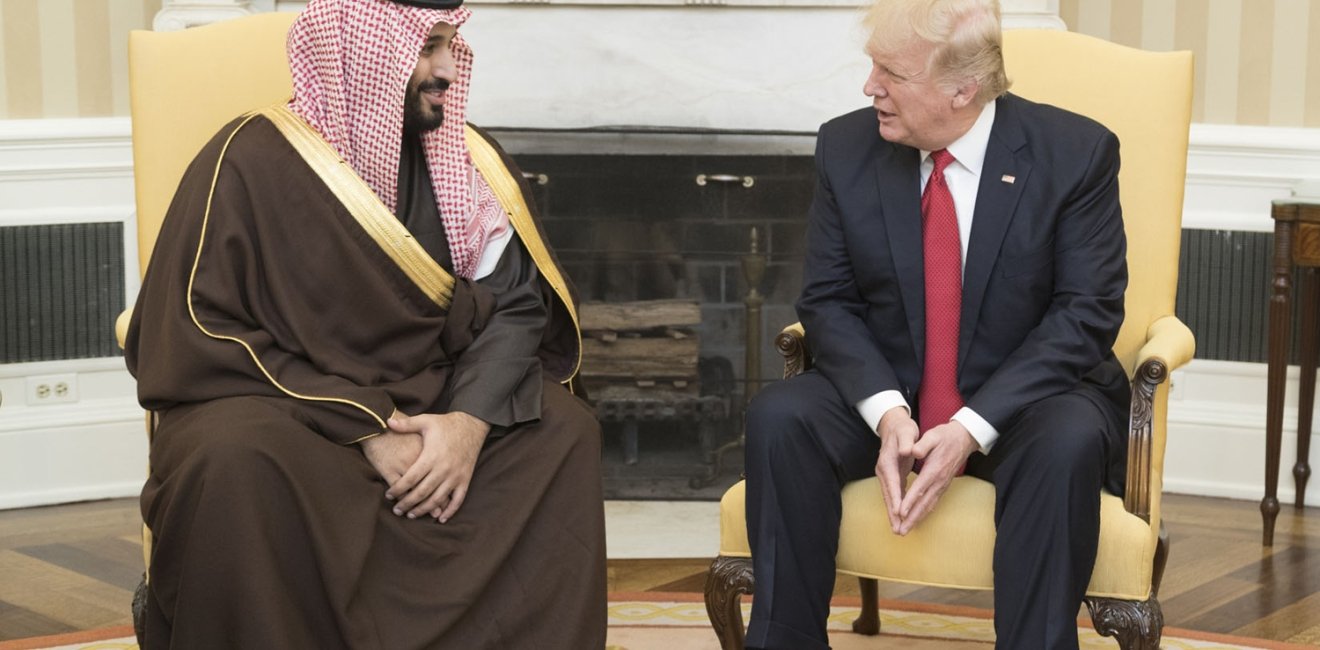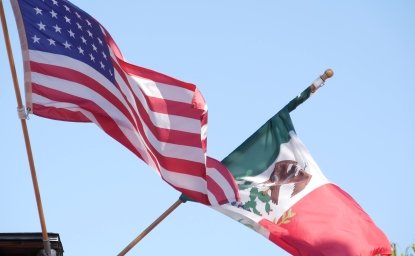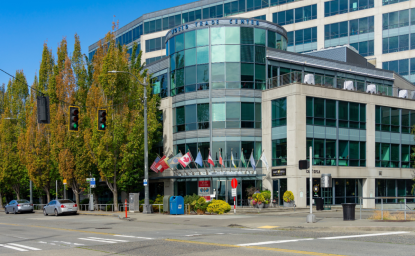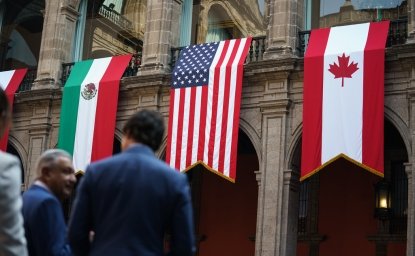President-Elect Donald J. Trump and Saudi Arabia’s de facto ruler, Crown Prince Mohammed bin Salman (MBS), would seem set to expand substantially the close personal relationship they developed during Trump’s first term in office. The highlights included Trump making his first trip abroad to the Saudi kingdom and almost convincing the Saudi leader to follow two other neighboring Arab monarchs in opening diplomatic relations with Israel. Since then, their business dealings have only expanded. But the two leaders now face thorny issues involving Iran, the Palestinians and oil that could well sour their friendship.
Trump is likely to launch once again his “maximum pressure” policy toward Iran, which he views as the root of all problems for the US and its Arab partners in the Middle East and has sworn to stop from becoming a nuclear power.
Shifting Saudi priorities
MBS doubtlessly agrees that Iran, Saudi Arabia’s chief rival for primacy in the Persian Gulf region, is his main threat. But the crown prince has launched a new policy of cautious reconciliation, rather than confrontation, with Iran. The switch began in March 2023 with the renewal of Saudi-Iranian diplomatic relations after a seven-year rupture.
One consequence of the new Saudi policy has been to neutralize all six Gulf Arab monarchies’ interest in siding with Israel in its direct military confrontation with Iran.
One consequence of the new Saudi policy has been to neutralize all six Gulf Arab monarchies’ interest in siding with Israel in its direct military confrontation with Iran. When Israel last month launched its latest tit-for-tat missile strike on Iran, none of them allowed Israeli warplanes to fly over their air space, even the two—the United Arab Emirates and Bahrain—which had established diplomatic relations with the Jewish state in 2020. Their refusal obliged Israel to fly over Syria and Iraq to reach its targets in Iran.
Another more visible sign of the new Saudi attitude came In a recent speech delivered at an Arab-Islamic summit hosted by Saudi Arabia at which Crown Prince Mohammed demanded Israel show respect for “the sovereignty of the Islamic Republic of Iran” and end its attacks on it.
A second issue certain to test the Trump-MBS relationship is the establishment of an independent Palestinian state alongside Israel, the so-called two-state solution that practically the entire international community is demanding, including the Biden Administration. Israeli Prime Minister Benjamin Netanyahu, on the other hand, is refusing even to consider it, while his ultra-nationalist cabinet ministers are pressing for the annexation of parts, if not all, of the Israeli-occupied West Bank.
During his first term, Trump showed his scorn for the Palestinian cause in multiple ways. He closed down the office of the Palestinian Authority in Washington and cut off $200 million in US financial support for this body, which rules over parts of the Israeli-occupied West Bank. He also recognized Jerusalem as the Israeli capital and ordered the US embassy to move there from Tel Aviv. In addition, Trump recognized the legality of a number of Israeli settlements in the West Bank. The Trump peace plan, which never got off the ground, envisaged a diminutive Palestinian state without Jerusalem as its capital and Israel still in charge of its overall security.
By contrast, MBS has switched his stand 180 degrees since Israel’s killing of 44,000 Palestinians, displacement of 90 percent of Gaza’s 2.2 million population and massive destruction of homes and infrastructure throughout the territory. This onslaught came in retaliation for Hamas’ incursion into southern Israel in October 2023, resulting in 1,200 Israeli deaths. The Saudi crown prince has recently begun referring to Israel’s war tactics as “genocide” and demanding its acceptance of a Palestinian state as the sine qua non for Saudi Arabia establishing diplomatic ties with the Jewish state.
Before the Hamas incursion, the Saudi leader had been tilting toward following the United Arab Emirates and Bahrain in initiating relations with Israel without any resolution of the Palestinian issue. Now, he has taken the lead in putting together a coalition of Arab and Muslim states, which held a summit on November 11 in Riyadh to press for a two-state solution. He has also repeatedly called upon countries like the United States, which have not yet recognized a Palestinian state, to do so. Already, 146 of the 193 members of the United Nations have extended such recognition.
Their discord over this issue seems destined to worsen. Israeli settlers on the West Bank and rightwing members of Netanyahu’s government are stepping up calls for outright annexation of the Israeli-occupied territory. If this happens and Trump approves, his relations with MBS are certain to suffer.
Clashing oil agendas
The third issue of potential discord between the two leaders is oil production. The United States already produces the most oil of any country in the world—more than 13 million barrels a day. This is 4 million barrels more than Saudi Arabia currently produces daily. Trump wants to increase US output and exports substantially. This will sharpen the two countries’ competition for market share. It will also help to keep prices well below the $96 a barrel that the International Monetary Fund estimates Saudi Arabia needs to balance its budget.
Saudi Arabia has been struggling with its eleven other partners in the Organization of Petroleum Exporting Countries (OPEC) in coordination mainly with Russia, another top oil exporter, to stop the steady drop in oil prices. These countries have already cut their collective production by 2.2 million barrels a day and keep delaying any increase in their struggle to bolster prices. The average annual price for a barrel of North Sea Brent oil, one major pricing benchmark, has fallen 18 dollars since 2022, according to one calculation. The average US price for a gallon of gasoline has fallen nearly one dollar in that same period.
Saudi Arabia, Russia, and the United States are now the world’s top oil exporters. While the first two have state-run companies that have found a way to cooperate in setting production limits, it seems unlikely that Trump will follow suit. He will want lower oil prices to battle inflation, a main cause of Kamala Harris’s loss in the presidential election. In any case, Trump has no way of dictating production levels to US private companies.
How these looming conflicts will intersect with the multiplying joint business ventures between MBS and the entire Trump family remains to be seen. In 2022, MBS’s Public Investment Fund (PIF) invested $2 billion in a private equity firm founded and run by Trump’s son-in-law, Jarred Kushner. The Trump Organization, run by Trump’s two sons, Eric and Donald Jr., just completed its first investment in the kingdom, a luxury Trump Tower Hotel in Jeddah.
Trump himself has supported an attempt by the Saudi PIF to muscle in on the US golfing industry. He has backed a Saudi multi-billion dollar outlay to take over the Professional Golfers’ Association of America (PGA), and his golf courses have hosted tournaments of the rival Saudi start-up LIV Golf. The two have been negotiating a merger, so far unsuccessfully.
What is clear is that the Middle East policies of MBS and Trump are increasingly at odds on core issues for both.
What is clear is that the Middle East policies of MBS and Trump are increasingly at odds on core issues for both. What remains to be seen is how the Trump family’s expanding investments in Saudi Arabia under MBS will influence US foreign policy and national interests there.
The views expressed in this piece are those of the author and do not express the official position of the Wilson Center.






